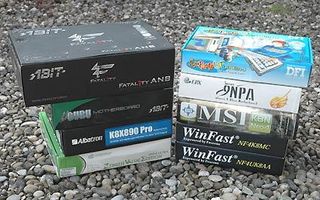Life in the Fast Lane: New Boards for the Athlon 64
Introduction

PCI Express (PCIe) mainboards for AMD's Athlon 64 processor have been in the stores since the fall of 2004. Until now, though, these boards were not able to really "pull away" from ones with AGP 8X. This is no wonder, given that the maximum AGP bandwidth of up to 2 GB/s is entirely adequate in most cases. Even so, with the next generation of graphics cards, manufacturers' attention will switch to PCI Express; that is where the future lies, and even today there is little difference in price.
The future top models from chipmakers ATI and NVIDIA will be based on a PCIe architecture, while AGP versions will still stick around for the foreseeable future in the low- and mid-price segments. In order to establish PCI Express as the mainstay of the market once and for all, however, more and more AGP graphics cards will presumably be put out running at lower clock speeds than comparable PCIe models.
Not all users need 3D performance, of course. A glance at the copious functions offered by the latest chipsets also reveals other benefits for those in the PCIe camp. The nForce4 Ultra from NVIDIA, for instance, already supports Serial ATA II at 300 MB/s and Native Command Queuing (NCQ). Also included is a fast network controller at 1 GBit/s, featuring NVIDIA's own ActiveArmor firewall.
Rivals ATI and VIA offer four and two SATA ports for 150 MB/s per channel respectively; Gigabit LAN is only possible using third-party chips. There's no bottleneck, though, as these are connected with PCI Express. Of course compulsory features include support for RAID 0, 1 and 0+1, a worthy sound system, USB 2.0 and PCI interfaces, and two UltraATA channels for optical drives and older hard drives. Generally speaking, the ATI and VIA models cost slightly less than NVIDIA's.
Our recommendation today is to go for a PCI Express board, whatever the case. Their modern interfaces not only promise a longer useful life, but a simple BIOS update gives all models the capacity to take on the Athlon 64 X2 dual core processor expected in late summer. That said, let's now examine which boards come out on top.
Stay on the Cutting Edge
Join the experts who read Tom's Hardware for the inside track on enthusiast PC tech news — and have for over 25 years. We'll send breaking news and in-depth reviews of CPUs, GPUs, AI, maker hardware and more straight to your inbox.
Current page: Introduction
Next Page AMD Plans: New Processor Socket And DDR2 For 2006Most Popular

